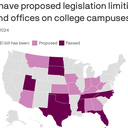Anti-DEI bills targeting colleges have surged since 2021

Proposals aimed at dismantling diversity, equity and inclusion (DEI) programs on college campuses have been introduced in 21 states since 2021 — and nine of the states have approved such laws, an Axios analysis finds.
Why it matters: The wave of anti-DEI bills in state legislatures has come amid an ongoing conservative backlash against initiatives aimed at fighting systemic racism.
Zoom in: The backlash has been driven by Republican lawmakers in response to the racial reckoning across America that was ignited in 2020 by the murder of George Floyd, an African American man who'd been detained by Minneapolis police.
- That led schools, governments, corporations and others to create diversity initiatives that typically focus on racial sensitivity — and the nation's history of overlooking many of the stories of non-white Americans.
- The backlash that followed focused largely on conservatives' claims that DEI programs undermine traditional teachings of American history — and often had the effect of making white students feel guilty.
By the numbers: More than two dozen anti-DEI bills or proposals banning antiracism programs in higher education have been introduced in state legislatures in the past three years, according to the National Conference of State Legislatures data analyzed by Axios.
- At least nine states have passed legislation to limit DEI programs or "divisive concepts" on college campuses, according to the conference and an Axios analysis.
- Florida, Mississippi, North Carolina, North Dakota, Oklahoma, South Dakota, Tennessee, Texas and Utah have adopted such laws.
- The laws include bans on funding for campus activities or offices that promote diversity.
The intrigue: Only two states — Washington and New Mexico — have passed bills since 2022 requiring higher education institutions to offer training on DEI or antiracism, the NCSL data reveals.
State of play: The surge in anti-DEI bills follows a conservative-led effort in several states to limit discussions of racism in K-12 public schools under the guise of banning critical race theory — a graduate school concept rarely taught in grade school.
- Conservative think tanks such as the Claremont Institute have given templates for anti-DEI bills to lawmakers, lobbyists, activists and others, the New York Times has reported.
What they're saying: "We fight DEI because we see it as a mortal threat to the American way of life," Claremont Institute president Ryan P. Williams and state coalitions senior director Scott Yenor recently wrote on the think tank's website.
- "The problem of DEI has, in one form or another, haunted America for decades. It has remade the workplace. It has distorted our politics."
- The pair said they opposed "the radical homosexual and transexual rights movements" and believed "civil rights ideology creates a two-tiered system of justice."
The other side: The purpose of DEI is to transform the systems that harm people, Janice Gassam Asare, author of "Decentering Whiteness in the Workplace: A Guide for Equity and Inclusion," tells Axios.
- DEI forces people to have difficult conversations about systems that discriminate, and it doesn't single out white people or call all of them racist, Asare said.
- Getting rid of DEI programs would make it harder for people who are already marginalized to get into the medical field or other highly skilled professions, she said.
Between the lines: The anti-DEI movement has been fueled by some Republicans openly promoting the once-fringe "white replacement theory," and white billionaires such as Bill Ackman and Elon Musk railing against DEI initiatives.
- The Supreme Court's rejection of affirmative action in college admissions last year also emboldened DEI opponents.
The big picture: Generation Z, which includes most of today's college students, are the most racial and ethnically diverse generations in the nation's history, but people of color are still underrepresented at elite colleges and in board rooms.
What's next: Some college administrations and boards may not wait for state laws to eradicate DEI programs in schools, and could defund them under pressure.
- The University of Nebraska-Lincoln, for example, is proposing to eliminate positions and restructure its DEI office.